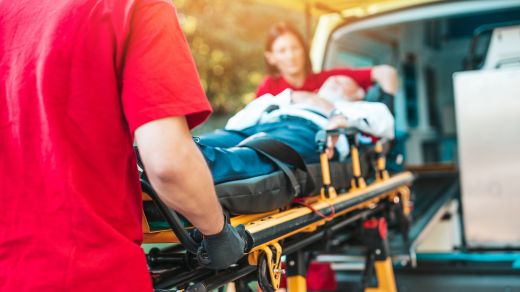Blood pressure values above 180/110 mmHg can be signs of a hypertensive crisis and are considered an emergency. How blood pressure imbalance manifests itself and what causes can trigger a hypertensive crisis.
- © hedgehog94 – stock.adobe.com
Quick overview: Frequently asked questions and answers
When do we speak of a hypertensive crisis? It occurs when blood pressure rises to values above 180/110 mmHg without acute physical exertion. If organ damage occurs, it is a hypertensive emergency, which can be life-threatening.
How does a hypertensive crisis manifest itself? Signs include a red head, severe headache or pressure in the head, nausea and vomiting. In a hypertensive emergency, chest tightness, difficulty breathing, vision problems, and numbness may occur.
What triggers a hypertensive crisis? A hypertensive crisis is often triggered by high blood pressure. Other causes may include kidney disease, hormonal imbalances, stress or certain medications.
Article contents at a glance:
What is a hypertensive crisis?
If you have high blood pressure (hypertension), the values are over 140/90 mmHg. If blood pressure suddenly continues to rise, experts speak of a hypertensive crisis (blood pressure imbalance, high blood pressure crisis). Experts define this blood pressure crisis as an increase in blood pressure above 180/120 mmHg.
Although the hypertensive crisis is always a serious situation, it is rarely acutely life-threatening and is easily treatable.
Hypertensive emergency
If, in addition to the blood pressure imbalance, organ damage occurs (for example to the heart or kidneys), a life-threatening hypertensive emergency occurs. Here, the greatly increased blood pressure is a symptom of an acute disease of the cardiovascular system such as a heart attack (myocardial infarction) or a stroke (apoplexy).
Signs of hypertensive crisis
Because the significant increase in blood pressure occurs suddenly, those affected usually notice this quickly. The main symptoms of hypertensive crisis are:
- Headache
- Red head
- Drowsiness, impaired consciousness
- dizziness
- nausea
- Vomit
- Nosebleeds (epistaxis)
- Chest tightness (angina pectoris)
- Cardiac arrhythmia (arrhythmia)
- great unrest (agitation)
- Shortness of breath (dyspnea)
- Visual disturbances (papillary congestion)
- Kidney dysfunction, such as blood in the urine (hematuria) or protein in the urine (proteinuria)
- Pain, especially in the chest
Symptoms of hypertensive emergency
Chest pain, shortness of breath, speech problems, numb skin and paralysis are symptoms of a hypertensive emergency. They depend on which organ is affected. In the case of a stroke, in addition to the greatly increased blood pressure, the focus is on neurological deficits; in the case of a heart attack, the focus is on chest pain.
These causes trigger a hypertensive crisis
A hypertensive blood pressure imbalance can have various causes. It usually occurs in people who already suffer from arterial hypertension. Common causes and risk factors for a blood pressure crisis include:
Incorrect dosage of blood pressure medication due to forgetting or interrupting the usual medication treatment
untreated high blood pressure
acute kidney disease
Renal artery stenosis
hypertensive diseases of pregnancy
Alcohol consumption or alcohol withdrawal
stimulant drugs like cocaine
Pheochromocytoma (hormonally active tumor of the adrenal glands)
Tyramine-rich diet when taking MAO inhibitors
High blood pressure values in a hypertensive emergency, on the other hand, are a symptom of a disorder of the cardiovascular system. These are caused by acute illnesses such as a stroke, acute pulmonary edema, heart attack or heart failure.
Psychological causes of a hypertensive crisis
Existing hypertension can also be derailed by psychological factors. For example, massive stress, a panic attack or another emotional state of excitement can trigger the high blood pressure crisis.
Diagnosis and behavior in the event of a sudden rise in blood pressure
The most important measure for all blood pressure imbalances is: Stay calm and call 112 immediately. Based on the symptoms described and by measuring your blood pressure, the doctor can usually quickly distinguish whether it is a hypertensive crisis or a hypertensive emergency.
Most people affected are people who already have high blood pressure and therefore have a measuring device. If you measure values above 180 mmHg, you should seek medical attention. Further diagnostic tests can be carried out here.
Help in an emergency: therapy for hypertensive crisis
In the case of a hypertensive crisis, treatment should begin no later than 24 hours after it occurs, as serious complications can develop if left untreated. A hypertensive emergency must be treated immediately to ensure the patient’s survival.
The aim of treating hypertensive derailment is to slowly lower blood pressure over the next 24 hours. This often happens as an inpatient in a hospital. Monitoring devices check whether blood pressure is regulated by medication administered.
When a doctor treats a hypertensive crisis, the following medications are primarily used:
The first step is often to administer an oral antihypertensive drug, preferably an ACE inhibitor.
If blood pressure does not decrease, nitroglycerin is available, which is administered as a spray into the mouth. However, its use is off-label, meaning the drug is not officially approved for use.
If necessary, additional antihypertensive drugs given intravenously can be considered. These include the active ingredients urapidil, nicardipine and labetalol.
In very severe cases of a high blood pressure crisis, nitroprusside can be given intravenously for a short time. In the intensive care unit, the active ingredient is used as an antihypertensive medication.
The active ingredients nifedipine or nitrendipine are no longer used today because blood pressure can drop too quickly and this can lead to an acceleration of the heart rate (reflex tachycardia).
The prognosis for hypertensive crisis is good. In most cases, it is possible to slowly lower blood pressure to below 160/90 mmHg with medication.
Treatment of the hypertensive emergency
In a hypertensive emergency, organs, usually the heart, brain and kidneys, are at acute risk. Therefore, blood pressure must be reduced as quickly as possible. The focus is on treating the acute underlying illness such as a heart attack or stroke. This indirectly lowers blood pressure. Additionally, antihypertensive medications can provide support.
In an emergency, blood pressure can be reduced in a controlled manner using intravenously injected medication. The active ingredient urapidil is the drug of choice here. Beta blockers can also be used
The change in blood pressure must be monitored closely, as falling too quickly can lead to inadequate supply to the brain or other organs. As a result, permanent damage to the organs can occur.


